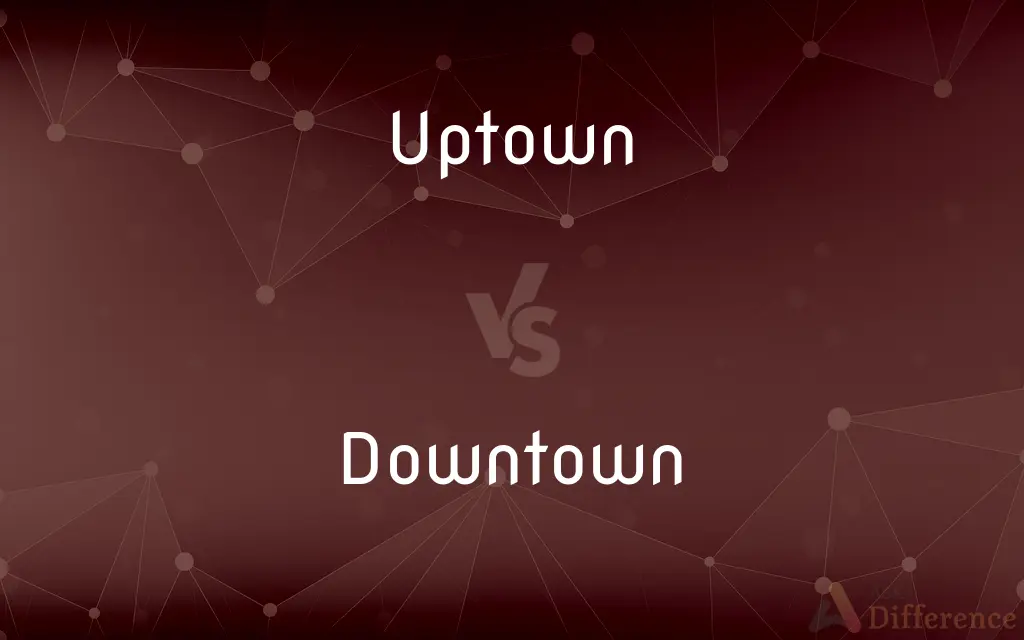Uptown vs. Downtown — What's the Difference?
Edited by Tayyaba Rehman — By Fiza Rafique — Updated on September 21, 2023
Uptown generally refers to the residential or suburban area of a city, often situated to the north. Downtown usually refers to the central business district or heart of the city, often located at or near the southern part of the city.

Difference Between Uptown and Downtown
Table of Contents
ADVERTISEMENT
Key Differences
Uptown and Downtown are terms often used to describe different parts of a city, each with its own distinctive characteristics. Uptown typically refers to the area that is more residential, quieter, and sometimes situated in the northern part of the city. Downtown, in contrast, is usually the central business district where you'll find a concentration of offices, shops, and entertainment venues.
The use of the terms Uptown and Downtown can vary from city to city, depending on the city's layout and history. In some cities, uptown is literally "up," situated on higher ground, while downtown might be at a lower elevation. But in general terms, uptown is often considered more residential and downtown more commercial.
In terms of transportation, you often hear phrases like "going downtown" or "headed uptown," which give clues to the direction of travel relative to the city’s core. In many cities, public transportation will have routes specifically designed to take passengers between uptown and downtown areas.
While Uptown and Downtown are used commonly in American English, they are less frequent in other variants of English, where terms like "city center" might be used instead of downtown. In American cities, these terms can sometimes be official designations used in city planning and real estate.
Comparison Chart
Typical Characteristics
Residential, quieter
Commercial, busier
ADVERTISEMENT
Common Location
Often in the north
Often in the south
Elevation
Sometimes higher
Sometimes lower
Activities
Living, some leisure
Working, shopping, entertainment
Transportation
Routes head away from city center
Routes head towards city center
Compare with Definitions
Uptown
Generally refers to the residential part of a city.
We live uptown near the park.
Downtown
Often located in the southern part of the city.
Downtown traffic is busiest during office hours.
Uptown
Sometimes located on higher ground.
The view from uptown is spectacular.
Downtown
Refers to the central business district of a city.
I work downtown near the financial hub.
Uptown
Known for being quieter and less busy.
I prefer the peaceful atmosphere of uptown.
Downtown
Often a focus for public transportation.
Most bus routes have a stop downtown.
Uptown
Of, in, or characteristic of the residential area of a town or city
Uptown Manhattan
An uptown bar
Downtown
Usually busier and more crowded.
Downtown is always bustling with people.
Uptown
In or into an uptown area
He couldn't get a taxi to take him back uptown
Downtown
Downtown is a term primarily used in North America by English speakers to refer to a city's commercial, cultural and often the historical, political and geographic heart, and is often synonymous with its central business district (CBD). It is marked by a cluster of tall buildings, cultural institutions and the convergence of rail transit and bus lines.
Uptown
The uptown area of a town or city
Cambridge's uptown
Downtown
In or relating to the central part or main business and commercial area of a town or city
Downtown Chicago
A downtown bar
Uptown
The upper part of a town or city.
Downtown
In or into a downtown area
I drove downtown
Uptown
To, toward, or in the upper part of a town or city.
Downtown
The downtown area of a town or city
The heart of Pittsburgh's downtown
Uptown
Of, relating to, or located uptown.
Downtown
The lower part or the business center of a city or town.
Uptown
The residential part of a city, away from the commercial center
Downtown
To, toward, or in the lower part or the business center of a city or town.
Uptown
In the upper part of a town.
Downtown
Of, relating to, or located downtown.
Uptown
Of or relating to an affluent area or population.
Uptown problems
Downtown
Of, relating to, or situated in the central business district
John walked every day to his downtown job.
Uptown
To or in the upper part of a town.
Let's go uptown and try out that new restaurant.
Downtown
In or towards the central business district.
You need to go downtown four blocks.
Uptown
To or in the upper part of a town; as, to go uptown.
Downtown
(basketball) Outside the three-point line, or generally far from the basket.
That shot came from way downtown!
Uptown
Situated in, or belonging to, the upper part of a town or city; as, a uptown street, shop, etc.; uptown society.
Downtown
The main business part of a city or town, usually located at or near its center.
Uptown
A residential part of town away from the central commercial district
Downtown
The human genitalia.
Uptown
Of or located in the upper part of a town;
Uptown residential areas
Downtown
(slang) heroin.
Uptown
Toward or in the upper part of town
Downtown
The commercial center of a town or city
Uptown
Often situated to the north of the city.
Uptown is usually cooler due to its northern location.
Downtown
Of or located in the lower part of a town, or in the business center;
Downtown Manhattan
Delinquents roaming the downtown streets
Uptown
May also contain upscale shopping and dining.
Uptown boasts some of the city's finest restaurants.
Downtown
Toward or in the lower or central part of town
Downtown
Known for commercial activities and entertainment.
Downtown comes alive at night with theaters and bars.
Common Curiosities
Is Downtown always busy?
Generally, yes. It's often the commercial and entertainment hub of a city.
Can Uptown and Downtown be official city designations?
In some American cities, yes. They can be used in city planning and real estate.
Is Uptown always in the north?
Usually, but not always. The terms can vary by city.
Is Uptown usually residential?
Typically, yes. Uptown areas are often more residential and quieter.
What is Uptown?
Uptown generally refers to the residential or quieter part of a city, often located in the north.
What is Downtown?
Downtown usually refers to the central business district or heart of the city, often situated in the south.
Is Downtown more expensive to live in?
It varies, but downtown areas can be more expensive due to higher demand and less residential space.
What activities are common Downtown?
Working, shopping, and entertainment are usually more common downtown.
Do Uptown and Downtown refer to elevation?
Sometimes. In some cities, uptown is at a higher elevation than downtown.
Can Uptown be upscale?
Yes, some uptown areas are known for their upscale amenities and higher living standards.
Are these terms used outside of the U.S.?
Less frequently. Other terms like "city center" might be used instead.
Can Uptown also have commercial areas?
Yes, some uptown areas also have shopping and dining, but they're generally less busy than downtown.
What kinds of transportation go to Downtown?
Public transportation often focuses on routes that head downtown.
Are these terms universally understood?
Mostly in American English. The usage and meaning can vary by city and country.
Do tourists usually visit Downtown?
Often, yes. Downtown areas usually have more attractions and amenities for tourists.
Share Your Discovery

Previous Comparison
Inboard vs. Onboard
Next Comparison
Tub vs. VatAuthor Spotlight
Written by
Fiza RafiqueFiza Rafique is a skilled content writer at AskDifference.com, where she meticulously refines and enhances written pieces. Drawing from her vast editorial expertise, Fiza ensures clarity, accuracy, and precision in every article. Passionate about language, she continually seeks to elevate the quality of content for readers worldwide.
Edited by
Tayyaba RehmanTayyaba Rehman is a distinguished writer, currently serving as a primary contributor to askdifference.com. As a researcher in semantics and etymology, Tayyaba's passion for the complexity of languages and their distinctions has found a perfect home on the platform. Tayyaba delves into the intricacies of language, distinguishing between commonly confused words and phrases, thereby providing clarity for readers worldwide.












































